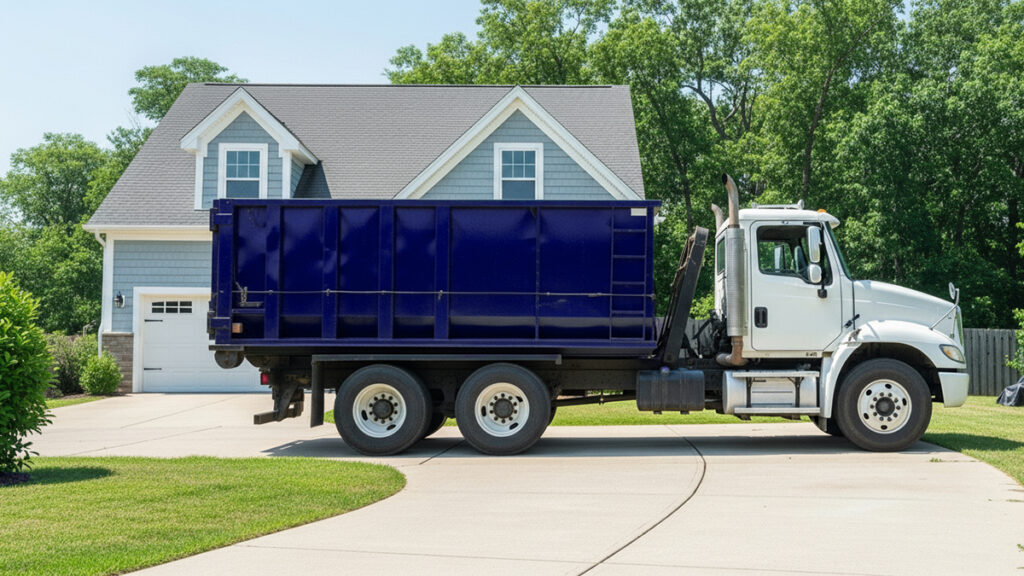Dumpster Rental Businesses: A Booming Business for Strategic, Hands-on Entrepreneurs
Launching a dumpster rental business is a unique opportunity for an entrepreneur. You will be entering a competitive market, but the profitability of your startup will be limited only by your creativity to monetize services. Although a sizeable up-front investment will be required, the dumpster rental industry has several built-in advantages:
- Year-round demand
- Strong profit margins
- Long-term partnerships
- Easy scalability
- Strategic revenue opportunities
In the U.S. alone, dumpster rentals are a $500 – 600 million sector within the $100 billion dollar waste management industry. The dumpster rental portion itself is expected to reach $1 billion by 2033.
Here’s why dumpster rental businesses appeal so strongly to blue-collar entrepreneurs:
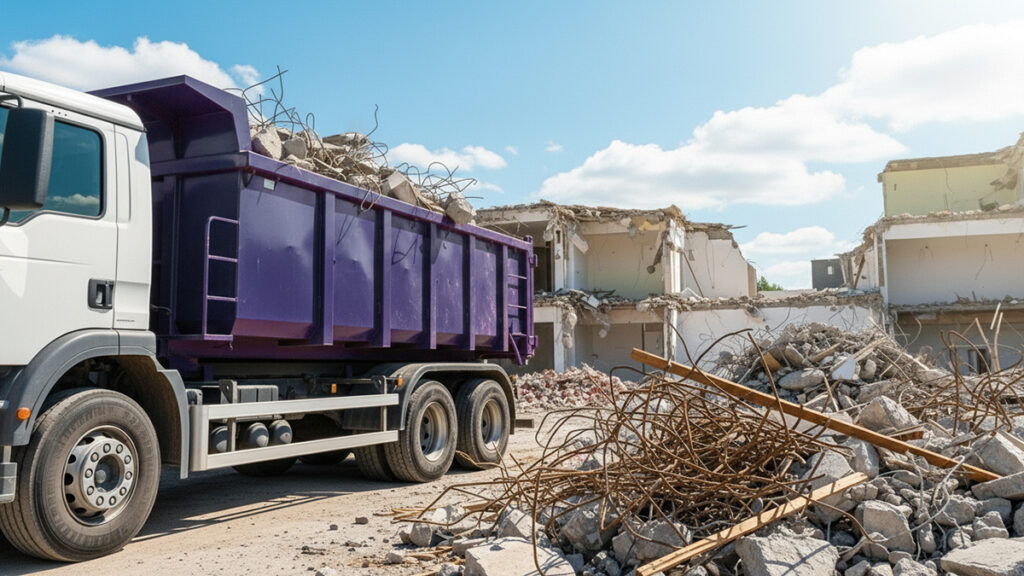
Dumpsters Are Always in Demand
Waste is constantly being generated. As construction projects, renovations, home remodels, roof replacements, and landscaping jobs increase, so too does the amount of waste that needs to be hauled away and disposed of. Because these projects happen year-round — regardless of the weather — dumpsters remain in consistently high demand.
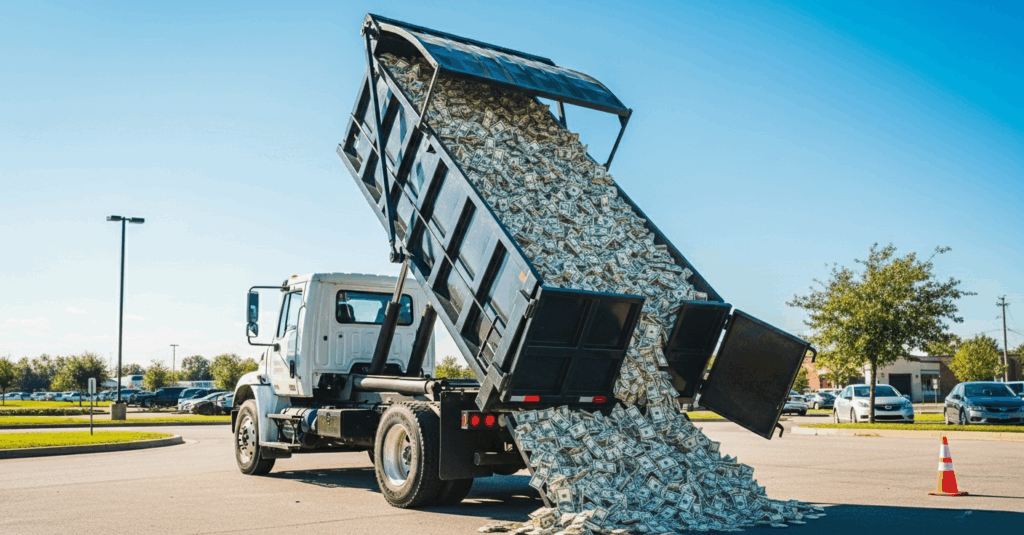
High Profit Margins
Dumpsters are long-lasting assets that require minimal maintenance. Three used 20-yard dumpsters and a roll-off truck will require an upfront investment of approximately $80,000. Each dumpster can be rented for $300 – $600 per job, with fuel and disposal fees being the only recurring expenses. Even at an average pace of 16 dumpster rentals per month, you should still be netting $300 profit per haul, which calculates out to $4,800 in monthly profit. This means that your initial $80,000 investment in equipment can be recovered in less than 18 months.
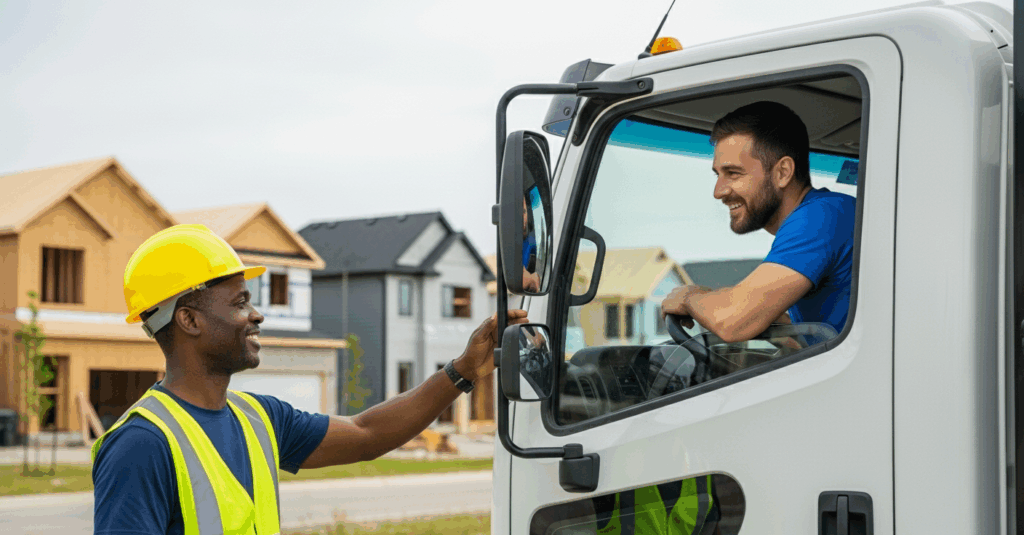
Long-term Partnerships
A key advantage of dumpster rentals is they naturally pair with other local businesses that need waste removal on a regular basis — contractors, roofers, landscapers, and property managers. Building partnerships with these businesses can set your business up with reliable revenue streams, without the need for aggressive marketing campaigns.
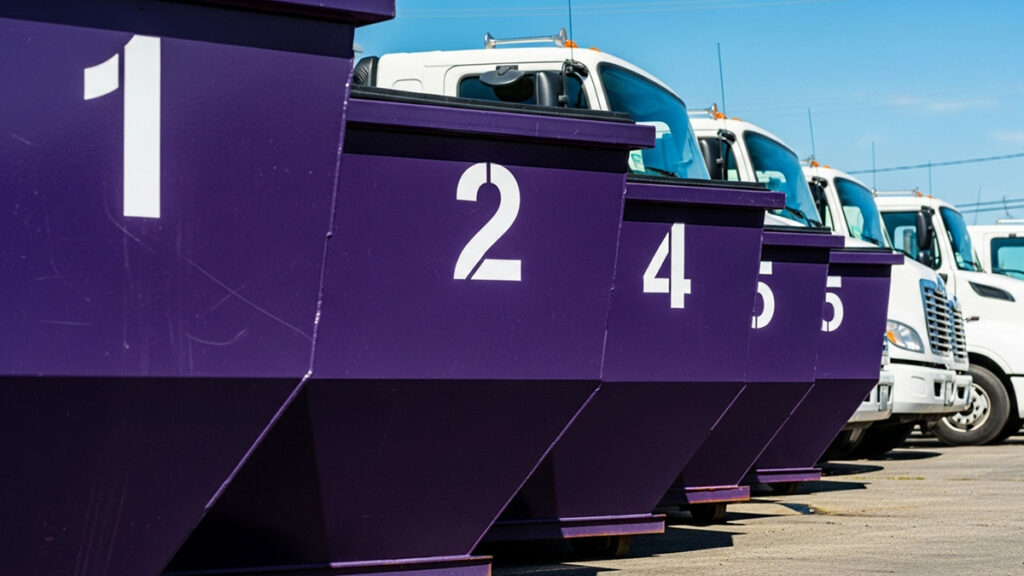
Straightforward Scalability
Perhaps more than any other side hustle, a dumpster rental business is especially easy to scale. The equipment requires minimal management, and demand isn’t tied to styles or trends, so you can operate with a uniform inventory. Because scheduling consists of simple drop-off and pickup duties, the delivery logistics are basic and predictable. With recurring customers providing a reliable income base, scaling becomes just a matter of buying more dumpsters and extending your service area.
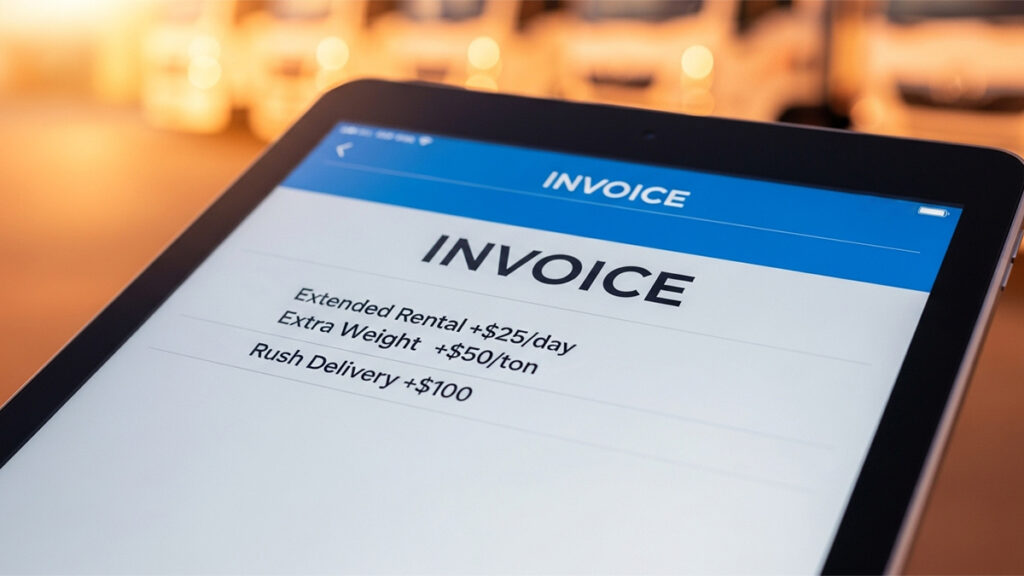
Strategic Revenue Opportunities
Another big upside to running a dumpster rental business is the opportunities to strategically maximize your revenue. Many customers value convenience and flexibility and are willing to pay extra for it. Common add-ons include extended rental periods, extra weight allowance, weekend service, rush delivery, and special material disposal. These upsells let you boost income without significantly increasing operating costs — driving your ROI higher.
What is Necessary to Start a Successful Dumpster Rental Business?
Launching a dumpster rental startup won’t require hiring employees or even having a storefront, but it will involve purchasing the necessary equipment, access to a storage lot, acquiring the required licenses, and deciding which upgrades to invest in to make your operations run efficiently from day one.
The Non-negotiables for Starting a Dumpster Rental Business
Running a dumpster rental business means that you will be selling your customers convenient, reliable waste removal, which requires a set of dumpsters, a suitable storage location, and a specialized vehicle to transport them.

Dumpsters
Dumpsters will be the primary assets of your business. Typically, new dumpster rental businesses start out with 10-yard, 15-yard, or even 20-yard roll-off dumpsters, which are the right size for construction jobs, roofing, and landscaping.
Brand new dumpsters can cost up to $7,000 each, but there are budget-friendly used options available in the $4,000 – $5,000 range. Since you’re selling a service, not appearances, you can start with dumpsters that are not cosmetically perfect.
That said, always do your due diligence in making sure that a used dumpster is structurally sound before buying it. You need your dumpsters to last at least a few years before having to replace them. For startups, it’s recommended that you start out with 3
— 5 dumpsters; for example, three used 20-yard dumpsters should cost about $15,000.
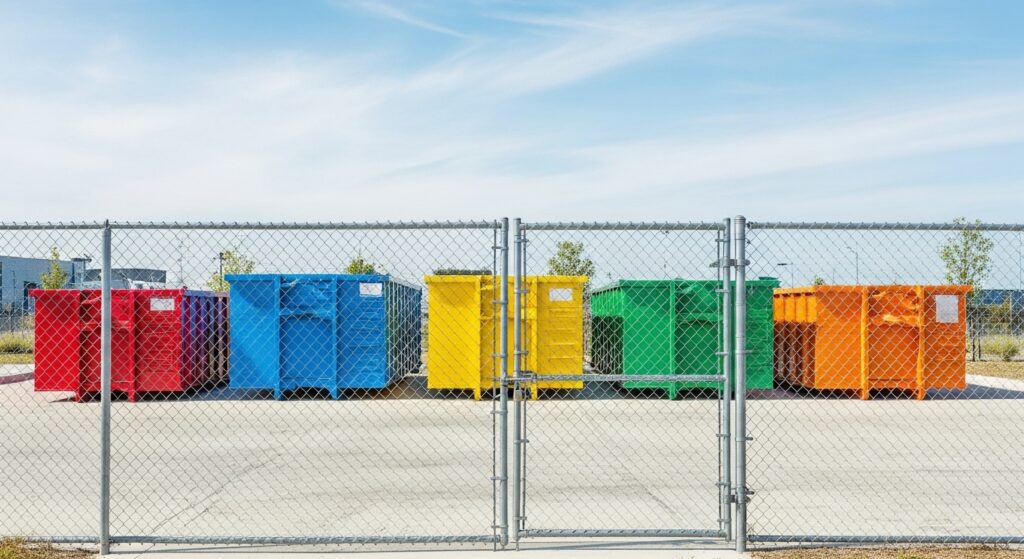
Storage
Your dumpsters and delivery truck are the essential property of your business, so you need a secure lot with enough space to store them. Ideally, your storage area should be organized for easy dumpster access, be close to your service area, and offer easy highway access to the waste disposal facility to keep your fuel costs down. Due to dumpster size, indoor storage will not be feasible, which means you need to consider the surface and local zoning laws of outdoor lots.
Lot Surface
Not all outdoor lots are the same when it comes to logistics. Case in point would be the lot surface. You want to store your dumpsters on a hard surface like asphalt or concrete, since a soft grass or dirt surface can cause problems with loading and unloading.
Local Zoning
Dumpster storage must comply with local zoning laws. Many local governments require permits for the outdoor storage of dumpsters and may require specific fencing standards for approval.
Renting a commercial or industrial lot to store your inventory normally costs $300–$1000 per month. To reduce your overhead, you can try to partner with local contractors or landscaping companies that already own or lease industrial storage space.
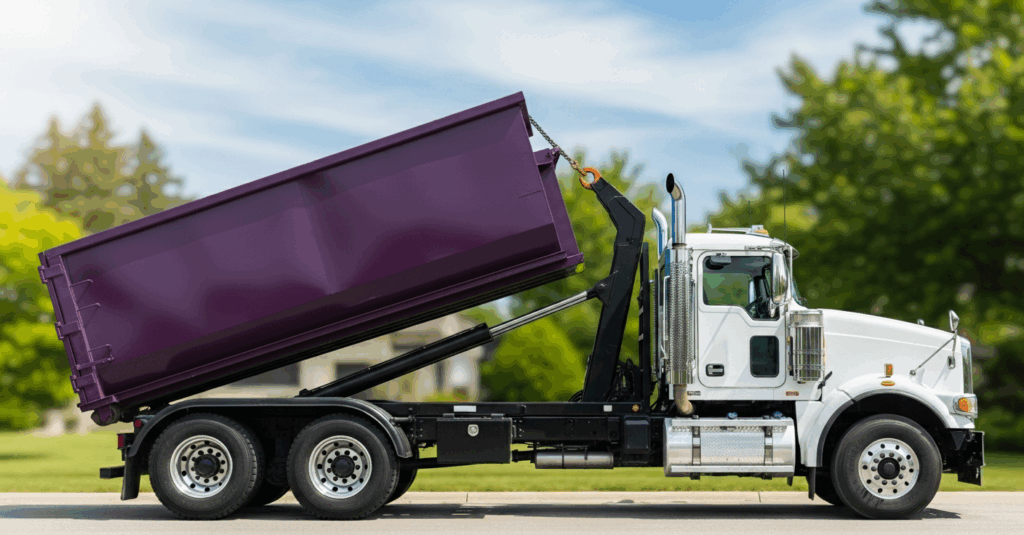
Delivery and Logistics
A delivery vehicle puts your dumpsters to use. Unlike many other side hustles, success in the dumpster rentals industry requires a specialized truck. A used model will cost around $65,000. Before purchasing, you’ll need to consider the loading setup, the manufacturer, and the weight rating.
Loading Setup
There are two main systems you can use to load and unload dumpsters: cable hoist and hooklift. The one you choose depends on factors like speed, upkeep, and cost.
A cable hoist system uses cables and a winch to pull dumpsters onto the bed of the truck. It’s the less expensive option, but takes more time to load and unload, and it has more moving parts requiring maintenance.
A hooklift uses a hydraulic arm to load and unload dumpsters. It allows you to handle different dumpster sizes and load or unload faster, but it’s also more expensive.
System Comparison
| Cable Hoist | Hooklift | |
|---|---|---|
| Loading Mechanics | Uses a winch and steel cable to pull the dumpster onto rails, then tilts to unload | Uses a hydraulic arm with a hook to lift and load/unload dumpsters directly |
| Container Compatibility | Typically uses roll-off containers with rollers and cable hook. Standard lengths and rail spacing | Requires containers with a hook bar. More flexibility for different body types (dumpsters, flatbeds, specialty bodies) |
| Loading Speed | Slower; takes more time to load and unload. | Faster; single motion designed for quick loading and turnaround. |
| Ease of Use | Requires more manual operation | Hydraulic controls make it simple to operate |
| Maintenance | More moving parts; cables and pulleys require regular replacement/repairs | Fewer moving parts; hydraulic system is easier to maintain overall |
| Durability | Durable but cables and pulleys wear out faster | Highly durable; hydraulic arms last longer with proper upkeep |
| Weight Capacity | Good for light to medium loads; heavy loads strain the cables | Handles heavier loads due to stronger hydraulic lifting power |
| Versatility | Limited to specific dumpster styles with cable rails | Very versatile; accommodates different container types and sizes |
| Cost | Lower upfront cost; budget-friendly for startups. | Higher upfront cost but can pay off in long-term efficiency |
| Best Use Case | Smaller rental businesses prioritizing affordability over speed. | High-volume businesses needing speed, flexibility, and heavier load capacity. |
Truck Manufacturer
Your truck will rack up miles and wear and tear quickly. This means you need to be proactive about maintenance and repairs. As you will likely only start out with only one vehicle, an inoperable truck represents the worst-case scenario for your business. It’s smart to invest in a well-known truck brand as this will save you time and money when you need to find replacement parts and a specialized mechanic to work on it.
Weight Rating
How much weight the truck can handle will impact not only the type of services you can offer, but also how profitable your runs will be and the rate at which you’ll have to replace wear items like brakes and tires. Trucks with a higher gross vehicle weight rating (GVWR) can carry more but generally cost more to buy and operate — and may require a special driver’s license to operate them. Smaller trucks avoid this but can limit the profitability of your runs. Since this will be your single biggest purchase for your startup, you should plan out which jobs your business will target to best balance cost and profitability.
Overhead and Admin Requirements
While your business will revolve around dumpster delivery and pickup, there are additional responsibilities that you’ll need to manage. The additional requirements you’ll need to keep your startup legally compliant will include:
- Business registration and tax permits
- Storage and right-of-way permits
- Commercial vehicle license and registration
- Rental agreements
- Solid waste and hauling permit
- Liability and commercial property insurance
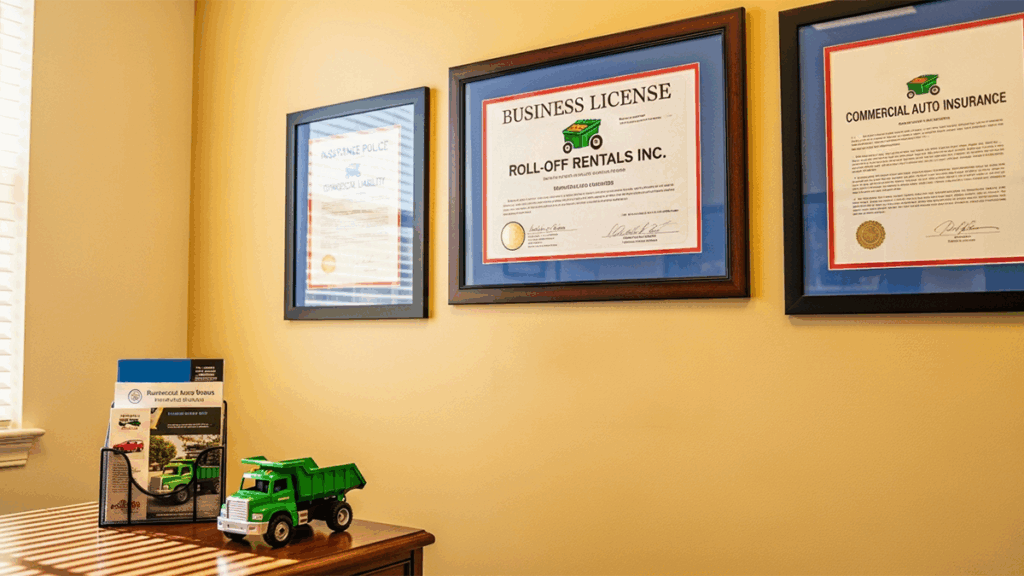
Business Registration and Permits
The permits and licenses required to run your dumpster rental business will vary depending on your city, county, and state. The first step is registering your business. This means creating a legal entity under which it will operate (most owners choose to register as an LLC for liability protection and credibility). You’ll likely need to register your business with your city or county to acquire the necessary tax, storage, and right-of-way permits.
Commercial Vehicle Registration and Licenses
Since your vehicle is being used for business purposes, most states require that it is registered as a commercial vehicle and displays commercial plates. Additionally, if your truck has a GVWR greater than 26,000 lbs then you will have to get a commercial driver’s license (CDL). You may also have to register with the Federal Motor Carrier Safety Administration to obtain a Department of Transportation (DOT) registration number to transport across state lines.
Rental Agreements
A rental agreement is the legally binding contract between your business and the customer. Having a signed agreement in place that clearly details the expectations and responsibilities of both parties will protect your business and help avoid disputes.
At a minimum, the rental agreement should contain:
- Customer information: name, address, and contact details
- Order details: dumpster size(s) and quantity
- Rental period: delivery and pickup dates/times
- Pricing and payment terms: total costs, deposits, late fees, optional services (ex. extended rental periods), and damage charges
- Liability and safety rules: proper use, damage responsibility, no overfilling, no hazardous materials
- Prohibited materials: a clear list of prohibited items (e.g., tires, paint, chemicals)
- Site access: customer responsibility for safe, unobstructed access for delivery/pickup
- Permitting responsibility: clarifies who is responsible for required permits (e.g., right-of-way)
- Cancellation policy: timelines and refund terms
- Signatures: from both parties to make the agreement binding
Although many dumpster startups operate with paper agreements, switching to digital contracts can save time, simplify record-keeping, and offer customers a more convenient booking experience.
Solid Waste Handling and Hauling Permit
This permit ensures your business complies with local environmental regulations, and is required to legally collect, transport, and dispose of waste. These permits are typically issued at the state or county level, and it will be essential to obtain one before you start operations.
Insurance Policies
Operating a dumpster rental business means working with heavy equipment. Accidents can happen, and the risk of serious damage is higher than that of other industries. Therefore, your dumpster rental business will need to carry insurance policies that protect you from liability and satisfy the licensing requirements to operate.
Liability Coverage
Liability insurance is essential for operating a dumpster business. Your policy should cover any property damage or injuries that result from the use of your equipment. It should
also cover legal expenses from accidents or lawsuits. When budgeting for overhead, be aware that a dumpster rental business will likely require higher liability limits due to the increased risk of property damage.
Commercial Property Coverage
Commercial property policies are almost always recommended in rental businesses. Dumpster rentals are an exception. Because dumpsters are heavy-duty, difficult to damage, and nearly impossible to steal, commercial property coverage is normally an unnecessary expense.
Valuable Tools for Optimization and Growth
The following resources are not essential to launch your dumpster rental startup, but they can streamline operations and support faster growth:
Business Website
Many dumpster rental businesses operate without a dedicated business website. In a sector so dependent on local SEO, having an optimized website is an easy opportunity to stand out from the competition.
Online Booking
A large percentage of dumpster rental businesses still manage their operations using spreadsheets — an inefficient, error-prone method that can lead to double-bookings and creates a poor user experience for customers. Online booking allows for convenient, 24/7 dumpster rental, and removes the burden of manual scheduling.
Online Payments
Online payments are now a standard customer expectation, yet many dumpster rental startups still lack this service. Allowing customers to pay at their chosen time, using their preferred method creates a better user experience, while business owners benefit from faster payment clearance and easier payment tracking.
Marketing Tools
Having a dedicated website is only the first step when it comes to establishing a strong digital presence and growing your business. While your website will be your main resource for customers, SEO, social media, and email campaigns are the strategies that drive them there.
See how DRS essentials makes your life easier by streamlining booking and payments
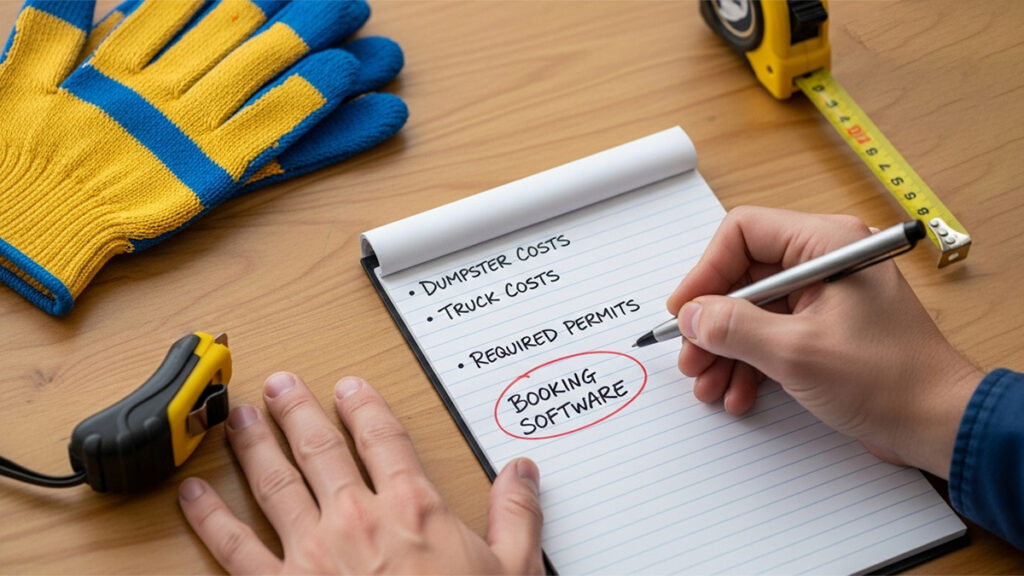
The Smart Way to Launch Your Dumpster Rental Business
For hands-on entrepreneurs weighing their options for starting a business in 2025, the dumpster rental industry offers enormous upside. Constant demand, strong profit margins, simple scalability, and additional earning potential make it one of today’s most lucrative startup opportunities.
As a result, one of the best decisions you can make to position your dumpster rental startup for consistent growth is investing in software created for the unique priorities and preferences of the industry. Our DRS essentials package was specifically designed as a do-it-yourself, easy-to-use solution for dumpster rental startups wanting access to tools like online booking, inventory management, integrated payments, automated messaging, website templates, a performance tracking dashboard, and built-in marketing tools.
Therefore, if you’re a budget-conscious dumpster rental entrepreneur seeking to scale up your business in 2025 and beyond, reach out to our sales team to get your questions answered and discuss the next steps.
Frequently Asked Questions
How Much Does It Cost to Start a Dumpster Rental Business?
The up-front cost to start a dumpster rental business is ~$90,000. A used roll-off truck will cost you about $65,000. Three used 20-yard dumpsters (the most popular size) will cost about $15,000. Then business registrations, waste permits, insurance coverage, storage, and operational costs will add on another ~$10,000.
| Expense | Estimated Cost Range |
|---|---|
| Startup inventory (3 used 20-yard dumpsters, used truck – cable hoist system ) | $80,000 |
| Insurance (Liability, Commercial Auto, Commercial Property) | $1,000–$3,000 |
| Business registration and vehicle registration | $600–$2,200 |
| Storage lot | $600 – 2,000 (first month) |
| Accessories (tarps, straps, etc.) | $500–$1500 |
| Digital marketing | $300 – $1,500 |
| Operational costs (fuel, disposal fees, maintenance, etc.) | $1,500–$4,000 |
| Total | ~$90,000 |
How Long Does It Take to Pay Back My Initial Investment?
Many dumpster rental startups are able to pay off their initial $90,000 cost in 18-24 months. For example, the number of hauls/month will range between 12 – 20 and each haul should net $250 – $350 in profit. So it will take ~19 months to net $90,000 for 16 hauls/month and $300 per haul. This is a much shorter payback windows than many other startup industries.
$300/haul x 16 hauls/month = $4,800/month
$90,000 ÷ $4,800/month = ~19 months
Keep in mind that digital marketing strategies to attract more customers, optimizing your hauling logistics, and strategically offering add-on services can net you more profit and shorten this payback window.
Is It Possible to Finance Dumpsters and Trucks?
Yes — financing is a good strategy to launch your dumpster rental business without covering the ~$90,000 by yourself. There are several available financing options to choose from. The most common would be an equipment loan where you borrow to purchase a truck and a set of dumpsters. The equipment serves as collateral for the loan. This is a good option for entrepreneurs with a long-term startup strategy as it allows you to get your business started, and earning, sooner while spreading the payments out over time.
Do I Need a Commercial Driver’s License (CDL) to Transport Dumpsters?
In short, yes. Although if your truck is under a gross vehicle weight rating (GVWR) of 26,000 lbs, you can operate without a CDL, the reality is that most roll-off trucks equipped to transport dumpsters are rated at class 7 (33,000 lbs) or 8 (66,000 lbs), both of which require at least a class B CDL. Additionally, if you plan, to transport dumpsters across state lines, you will need a CDL even with a truck rated under 26,000 lbs.
Do I Need a Solid Waste Hauling Permit in My City, County, or State?
Yes, most likely. You will probably need a solid waste hauling permit from your city or county that authorizes you to legally collect waste and charge customers for the service. There may also be additional permits required for transporting specific types of waste (ex. tires), and for placing a dumpster on a public street or sidewalk.
To determine the type and number of permits you need to operate your event rental business, a good protocol to follow would be:
- Search online for “solid-waste hauler” permits and include your specific city or county in the query
- Contact your local public works or solid waste management office to ask about “right of way permits” for placement of dumpsters on public right of ways
- Check with your state environmental agency about any state specific licenses, rules, and regulations
Keep in mind that proof of insurance will likely be required to apply for these permits. Plan to budget $50–$300 for permit fees, depending on the city, county, and state you will be operating in.



